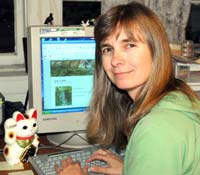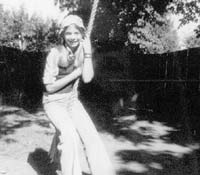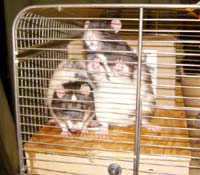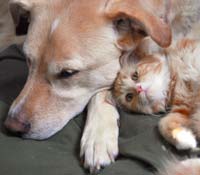interview
When did you start writing?
|
Jacqueline at work in her basement office (2007) |
The first story I remember writing was in grade two. The teacher told us that if we weren’t finished our story we could keep writing instead of starting our arithmetic (math) work. I liked arithmetic, but I thought it would be more fun to keep writing the story, so I made it as long as I could (about ten pages, which was pretty long for grade two). My teacher was so impressed she brought the story down to the staff room at lunch to show the other teachers.
I started thinking I wanted to be a writer when I was in grade six. I dreamed of writing a novel as good as The Lion the Witch and the Wardrobe or Anne of Green Gables. I tried writing a novel of my own back then, but didn’t get past the first or second chapter. In fact, I didn’t get a whole novel finished until almost thirty years later.
What was the first thing you had published?
A few years ago I was looking through an old trunk in my parents’ attic and found a letter I’d received from the local newspaper when I was twelve. It said they were paying me $2 to publish a poem I’d sent them. I’d forgotten all about that poem and that early start to my publishing career. After that I had things included in school year books and did other writing projects, but it took awhile before I actually got a story published. The first thing I had accepted was a short story in the collection Opening Tricks (Thistledown Press, 1998). My first novel, The Reunion, was published by Orca in 2002.
What were your favourite books when you were a child?
In grade six my teacher read The Lion, the Witch and The Wardrobe by C.S. Lewis out loud to the class, and I was totally hooked. I read the rest of the Narnia Chronicles as fast as I could. I also loved the Prydain fantasy series by Lloyd Alexander and all the books by Lucy Maud Montgomery (especially her Emily of New Moon series). I also really liked A Walk out of this World by Ruth Nichols, The Court of the Stone Children by Eleanor Cameron, A Wrinkle in Time by Madeline L’Engleand Secret in the Stlalakum Wild by Christie Harris. These are the books that inspired me to be a writer.
What are your favourite books now?
|
Jacquie, age 11, thinking about being a writer when she grows up |
I still like reading books meant for children and young adults, but there are so many good books out now that it’s hard to pick just a few. Some of my favourite Canadian kids’ book authors include Brian Doyle, Welwyn Wilton Katz, Beth Goobie, James Heneghan, Polly Horvath and so many others. I also enjoy escaping into the fantasy worlds of Garth Nix, Jenny Nimmo, Tamara Pierce, J.K. Rowling, Lian Hearn and others. Some of my favourite writers of books for adults include Barbara Kingsolver, Margaret Atwood, Michael Ondaatje, Ursula le Guin, Frank Herbert, D.H. Lawrence, Jane Austen, etc. etc., and my favourite poet right now is Lorna Crozier.
Where do you get your ideas?
Story ideas can come from anywhere and anything. Sometimes something I hear on the radio or see on TV sparks off an idea. Other times it’s a family story, an interesting bit of local history, an old photograph, something my dog did, or part of a conversation overheard on the bus that gets me thinking about a story. A story idea might start with something I’ve experienced myself, then end up going off in a totally different and invented direction.
Are your characters based on real people?
My novels Discovering Emily and Emily’s Dream are about a real person, the artist Emily Carr, who lived from 1871-1945. The stories are based on real things that happened to Emily Carr when she was a child and teenager, but I had to use my imagination to invent many of the details. In all my others books, the characters are totally fictional, though in some cases what a character says, does or feels might be inspired by something from my own or a friend or relative’s experience. The only exception to this is the dogs in the novel Dog House Blues and the rat in The Truth About Rats (and Dogs). In those cases, the animals were based on real animals I know, and several of the things Dumpster, the basset hound, does in Dog House Blues are things my friend’s basset hound, Basil, really did (like pull a pot of spaghetti off the stove).
Do you have a daily writing routine and what does it involve?
|
Looking after rats George and Sneaker was a fun part of researching The Truth About Rats (and Dogs) |
I try to do some writing every day and do most of it on a computer in my basement office. I have a problem with my eye muscles and eye strain, so I use large print on the computer screen and take breaks to rest my eyes. Usually, I write for 2-3 hours in the morning, then go on some kind of outing. When I’m out on the bus, Skytrain or walking somewhere I’m resting my eyes but also working on my story in my head. I always have a small notebook with me in case I want to jot down notes for the next scene in my story or any new ideas that pop into my head.
Do you spend much time doing research for a story?
I usually do quite a bit of research before starting a new story. For the Emily Carr books, for example, I had to read all about Emily Carr’s life and how people lived, dressed and did things in 19th century Victoria. I also visited the house where she grew up (which is now a museum) and walked all around the streets of her old neighbourhood, imagining what it looked like when she was a girl. I rode on a horse (for the first time since I was a kid) as part of my research for Emily’s horse experience in the second book.
For my two novels about kids and animals, I did a lot of research on dogs and rats, including taking care of three different pet rats for several months and interviewing a vet and animal shelter attendant. For my novel, Manga Touch, I visited Japan, interviewed Japanese high school students, read lots of manga, and researched Japanese customs, beliefs and folklore. I ended up with a lot more information than I needed for the book (which is often the case), but maybe I’ll use some of it in another story one day.
Do you find writing difficult or easy?
Sometimes writing is easy and sometimes it’s like squeezing water from a stone. Sometimes I can work at the computer for one hour and get several pages written. Other times I can work for two hours and only complete a couple paragraphs (I tend to edit as I go, so I can spend a lot of time reworking things before moving on).
How long does it take you to write a book?
|
Travelling to Japan was Jacqueline’s favourite research so far |
It usually takes me about a year to write a novel from start to finish, including research, writing and editing, but sometimes a story idea can sit in the back of my mind for years before I actually start writing it.
What makes you want to be a writer?
I think most writers, like most artists, feel a compulsion to create. It’s who we are, and we have to do it. My love of writing and my love of reading are connected. When I get lost in a good book, it almost feels like I am magically transported to a different place. When I get involved in writing a book, it can feel the same. Although it can be hard work, it can also feel like something magic is happening – like this whole world is magically coming to life. When the writing is going well it can be extremely exhilarating and satisfying.
What else do you like to do besides writing?
I like to read (I listen to books on tape or CD to rest my eyes), create art, blog, explore new places and different parts of my own city, take photographs, and hang out with my family and friends. I used to love skiing and playing ball hockey and have broken bones doing both during the past few years. The breaks have slowed me down a bit, but I still get in an occasional game of floor hockey or road hockey.
Do you have any children?
I have one daughter, who also likes to write stories, as well as climb trees and play soccer.
Do you have any pets?
|
New kitten, Curious, immediately took a liking to Jacqueline’s big dog, Dylan |
I have a big dog named Dylan, a Lab-mix adopted from the local animal shelter, and two cats, Meeko and Curious, also from the shelter.
Do you have any advice for someone who wants to be a writer?
The best advice I can give is to keep reading and keep writing. When you read good stories you end up digesting a lot about how a story works, and by practicing writing you strengthen your writing muscles and get into the writing habit. Write stories, keep a diary, write for your school newspaper or year book, write a blog, keep a secret poetry notebook… whatever type of writing you like. Don’t worry about writing a best selling novel right away. It might never happen. Write about what interests you, and write because you love writing.
If you want to learn more about writing, you might try taking a class or workshop (many community centres, colleges and libraries offer them). Some classes are also offered online. If you live in the Vancouver area, you could check out the Vancouver Public Library’s summer book camp for kids and teens.
If you’ve already written something you think is pretty good, why not submit it to a contest like the Surrey Public Library’s Young Adult Writers Contest, the Martyn Godfrey Young Writers Award or the Imperial Oil Foundation Writing Contest?
Want to find out more about how to get published? A good resource is Get Published! The Writing For Children Kit, available from The Canadian Children’s Book Centre. Also, watch for the upcoming book Writing for Kids and Teens by Marion Crook.

 see larger image
see larger image see larger image
see larger image see larger image
see larger image see larger image
see larger image see larger image
see larger image